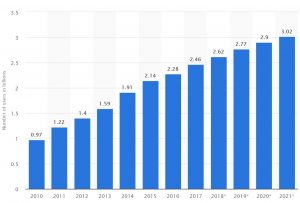For millenials, the driving force behind entertainment and productivity is social media. Canadians’ growing usage of mobile phones is reaching wider audiences, but as with all good things, is too much dangerous?

Source: Shutterstock Image Library
Habits are what define us. As smartphones become more convenient and available to us, so does the itch to check every few minutes. But why are we so inclined to see a screen, even solely as an impulse? Harvard scientists answered the discussion with a groundbreaking discovery: “individuals place high subjective value on opportunities to communicate their thoughts and feelings to others and that doing so engages neural and cognitive mechanisms associated with reward”. Though we are social beings, the proof of our intrinsic feelings of reward when showcasing ourselves means our lives are dependent on approval, whether we want it or not. Social media amplifies the reward while conveniently placing public metrics to invoke a deeper dependence. The article implies that as social media becomes more integrated with our lives, our dependence could potentially be on the level of necessities, such as food or shelter, to sustain our lives. As news of the study came out, social media usage transformed from an activity to a concern.

Source: American Marketing Association
Research spawned from social media like wildfire into the neuroscience community, with experts piecing together the science behind the effects. Brain imaging directly relates viewing photos on Facebook with activity across the amygdala and striatum, which hold control over our emotions and impulses. These sections are most active when our nerves receive rewards in the form of dopamine, which codes for happiness. Although there is nothing wrong with feeling happy, continuously feeling this way will polarize how you may normally act, whether with greater motivation or less. Just think of dopamine as a drug; in natural amounts, dopamine allows us to be more active and positive, but when taking too much, we can become so overloaded with emotion that we may become too euphoric or too depressed.

Source: Huffington Post India
Alongside neurological changes, behavioural changes are just as prevalent. When we are locked into needing the attention of others, we are locked into a cycle of wanting to feel happy and feeding our emotions. With each successive post or comment, meeting the dopamine needs becomes more challenging. In between intervals, the lack of engagement can lead to depression and loneliness.

Source: Statista Analytics Portal
Social media is here and it is spreading. Statista puts the pandemic in perspective. The number of social media users worldwide from 2010 to 2021 will grow from 0.97 billion to 3.02 billion within a decade. If you can just imagine what one billion means, multiply that by three. The spread, the growth, and the scale means you can guarantee the world is affected in a major way.
As prevalent a problem as social media addiction is in our world, there is no recognized treatment. Research in the past year has spiked to address the issue, including formally defining the problem as a start. There are more questions than answers, but for now, all we can really do is hold tight and keep our real friends close.
– Aaron Yen
One longer inspirational seminar about this topic can be found below. Simon Sinek approaches the societal problem of social media in much greater detail, and addresses everyone with “the millenial question”.

